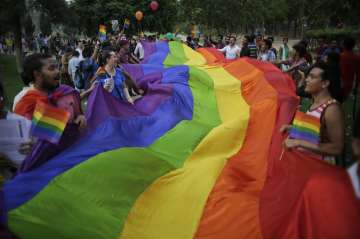New Delhi: The Supreme Court on Wednesday refused to examine a fresh Public Interest Litigation (PIL) seeking repealing of Section 377 and referred the petition to the Chief Justice of India, saying the issue was already pending before a constitution bench.
The petition was filed by some high-profile celebrities, who claim to be part of the LGBT community.
Senior advocate Arvind Datar told a bench of justice SA Bobde and justice Ashok Bhushan that it was the first time that LGBT celebrities themselves have approached the court against the archaic Section 377 of the IPC that criminalises homosexuality.
The celebrities, including chef Ritu Dalmia, hotelier Aman Nath and dancer N S Johar, have sought protection of their sexual rights on the ground that it is an integral part of the fundamental right to life.
The plea is likely to come up for consideration tomorrow when the court reopens after summer break.
The gay celebrities, in their plea, said their lives have been "inexorably constricted and their rights infringed" by the penal provision.
"Despite their achievements and contributions to India in various fields, they are being denied the right to sexuality, the most basic and inherent of fundamental rights. Section 377 renders them criminals in their own country," the plea said.
Earlier, a Supreme Court bench headed by Chief Justice T S Thakur had agreed to hear in an open court the curative plea of NGO 'Naz Foundation' and some gay rights activists.
On February 2, the court referred the curative plea to a five-judge Constitution Bench for re-examination of the 2-year old verdict by which a colonial law, criminalising consensual sexual acts between the same sex under section 377 of IPC, was restored.
The curative plea was filed against the dismissal of their petition seeking a review of the 2013 judgement of the apex court upholding the validity of section 377 (unnatural sexual offences) of IPC.
Now, the gay celebrities have filed a fresh writ petition to quash the penal provision.
Naz Foundation had filed a petition in December 2001 in the Delhi high court, which had on July 2, 2009, decriminalised Section 377. After refusing twice to entertain pleas against Section 377, the SC had on February 2 referred the issue to a five-judge bench.
Latest India News
